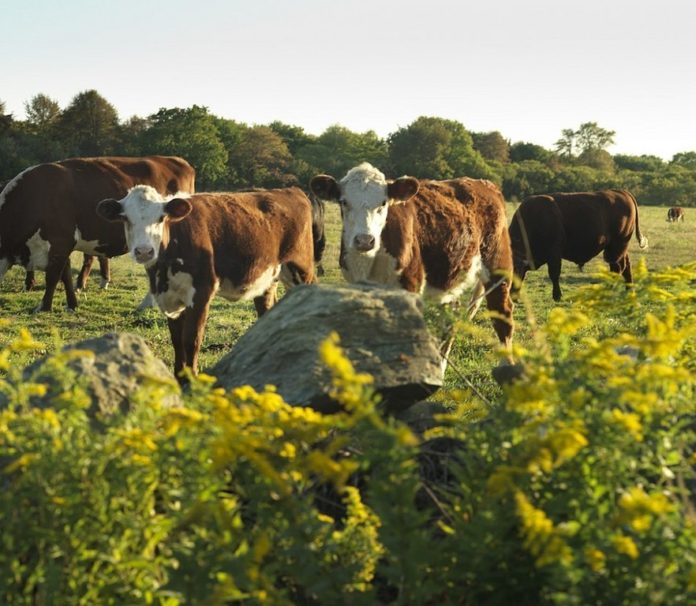
One of the largest working farms in Little Compton, where a piece of early Rhode Island history was made, will be protected from development for decades to come as part of a deal between its owners and a coalition of environmental and land preservation groups.
The Nature Conservancy, the Little Compton Agricultural Conservancy Trust and a handful of state and federal agencies cobbled together $3.6 million to purchase conservation easements on most of Treaty Rock Farm, a 120-acre property of rolling meadow, woods and coastal habitat situated along the banks of the Sakonnet River.
The farm, which extends from the river east to West Main Road, has been owned by the local Richmond family and actively farmed for more than 350 years. Rhode Island history was made on a rocky outcrop on the farm in 1675, when Awashonks, a chief of the Sakonnet tribe, and Benjamin Church, a colonist, forged an alliance at Treaty Rock to join forces in the King Philip’s War.
“The owners’ commitment to conservation coupled with our efforts and those of our partners have ensured that historic Treaty Rock Farm remains an open landscape with active agricultural use,” George Mason, chairman of the Little Compton Agricultural Conservancy Trust, said in a press release.
Three sisters – Josie Richmond Arkins, Lawre Goodnow, and Helen Richmond Webb – have owned the farm since the late 1990s, when they inherited the property. For several years a tenant farmer grew corn there. The sisters currently sell beef raised on the farm to the Rhode Island Beef Co-op, and hope to start supplying wool from the farm’s sheep to the Rhody Warm Blanket retailers, said John Berg, a spokesman for the Nature Conservancy.
For several years the sisters have sought a financial deal that would enable them to continue operating a working farm and conserve the rural, historic character of the property, Berg said.
“They’re basically all teachers, and although they received this from their father, it wasn’t a property that they had the means to even farm, much less hang on to,” he said.
The Little Compton Agricultural Conservancy Trust and the Rhode Island Agricultural Lands Preservation Commission now hold the deed to development rights for agriculture on 95 acres of the farm. The Nature Conservancy, meanwhile, holds a conservation easement over approximately 20 acres of land and tidal zone along the Sakonnet River.
Arkins, Goodnow and Webb will retain ownership of Treaty Rock Farm, as well as the right to build on two relatively small building lots on the parcel.
The R.I. Department of Environmental Management and the U.S. Department of Agriculture provided matching funds to assist the local conservation groups in securing $3.6 million to purchase the farm’s easement and development rights. Other funding partners for the project include the Champlin Foundations, the Sakonnet Preservation Association, and many private donors in the community.
The deal was announced on Nov. 30 at a press conference at Treaty Rock Farm attended by DEM director W. Michael “Mike” Sullivan and Janet Coit, director of The Nature Conservancy’s Rhode Island office. U.S. Sen. Jack Reed was unable to attend.
“For the Little Compton Land Trust it was about protecting really one of the biggest working farms in Little Compton, and for The Nature Conservancy it was about protecting it and restoring almost a half mile of shoreline along the Sakonnet River,” Berg said. •











